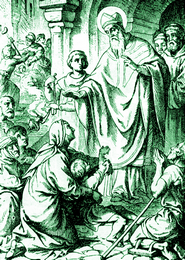Lives of the Saints
Our Models and Protectors
Spiritual Bouquet:
May 28

Saint Germanus
Bishop of Paris
(496-576)
Saint Germanus, the glory of the Church of France in the sixth century, was born in the territory of Autun, a city in south central France, about the year 496. In his youth he was conspicuous for his fervor. After being ordained priest, he was made abbot of Saint Symphorian's monastery, built near the walls of the city; he was favored at that time with the gifts of miracles and prophecy. It was his custom to pray for the greater part of the night in the church, while his monks slept. He bestowed on the poor of the region all that he could of the monastery's resources in provisions, and provoked at times the indignation of the religious, who at one time had him arrested and imprisoned by means of their defamation. He had scarcely been placed in a cell, when the doors opened of themselves, and the bishop, being informed of it, recognized his sanctity and treated him with great respect.
One night, in a dream, he thought a venerable old man presented him with the keys of the city of Paris, and said to him that God committed to his care the inhabitants of that city, that he might save them from perishing. Four years after this divine admonition, in 554, happening to be at Paris when that see became vacant by the death of the bishop Eusebius, he was raised to the episcopal chair, though he endeavored by many tears to decline the charge.
His promotion made no alteration in his mode of life. The same simplicity and frugality appeared in his dress, table, and furniture. His house was perpetually crowded with the poor and the afflicted, and he always had many beggars at his own table. He had edifying books read during the meals, that their souls and his own might be nourished. God gave to his sermons a wonderful influence over the minds of all ranks of people; so that the face of the whole city was in a very short time entirely changed.
King Childebert of the Francs, who until then had been an ambitious, worldly prince, was converted by the sweetness and the powerful discourses of the Saint. He founded many religious institutions and sent large sums of money to the good bishop, to be distributed among the indigent. When Saint Germanus learned that some poor folk, inhabitants of a village he was passing through one day, had been imprisoned by their lord for non-payment of debts, he went to pray and shed tears, face to the ground, at the gate of the subterranean jail where the unfortunate victims were lamenting. The overlord refused to open its doors, but an Angel came down and did so, and the entire crowd, scarcely believing in their good fortune, came as one person, to kneel in gratitude before their benefactor. At that point the overlord gave them full amnesty and canceled their debts. Demons fled from the bishop's presence, as they had before Our Lord, his Master, asking to be allowed to remain in the forest on the mountains.
In his old age Saint Germanus lost nothing of the zeal and activity with which he had filled the great duties of his station in the vigor of his age. Nor did the weakness to which his corporal austerities had reduced him make him alter anything in the mortifications of his penitential life, which redoubled in celestial ardor as he approached more closely the end of his course. By his zeal, the remains of idolatry were extirpated in France. The Saint continued his labors for the conversion of sinners, the deliverance of prisoners, and the relief of the poor, until he was called to receive his reward at the age of eighty, on the 28th of May, 576.
Les Petits Bollandistes: Vies des Saints, by Msgr. Paul Guérin (Bloud et Barral: Paris, 1882), Vol. 6; Little Pictorial Lives of the Saints, a compilation based on Butler's Lives of the Saints and other sources by John Gilmary Shea (Benziger Brothers: New York, 1894).